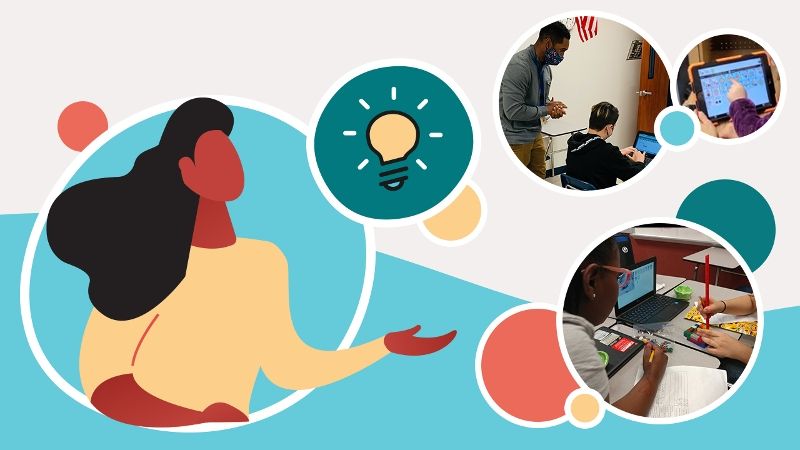Enhance Technology Skills to Support All Learners

Get Started Enhancing Technology Skills:
Districts that provide personalized professional development for all educators through professional learning communities, coaching, mentoring, critical partnerships and professional learning networks enable educators to enhance their abilities to design and deliver accessible, learner-centered experiences.
Practice: The district provides all educators with job-embedded professional learning and growth opportunities (i.e. coaching, mentoring, critical friend partnerships) that serve to extend and enhance an educator's ability to design and deliver accessible, learner-centered experiences.
Actions districts can take to enhance educators’ technology skills needed to support instruction for all students include:
- Provide job-embedded growth opportunities: The district provides educators with job-embedded professional learning and growth opportunities to enhance technology knowledge and skills for designing and delivering accessible, learner-centered experiences.
- Provide networking opportunities: The district provides educators opportunities to participate in meaningful professional learning communities or networks to enhance inclusive technology knowledge and skills for designing and delivering accessible, learner-centered experiences.
Learn from Our Partners

- Online Community: CITES Community of Practice, Center on Inclusive Technology & Education Systems (CITES) at CAST
- Webinar Series: Learning with the Authors of Inclusive Learning 365, Center on Inclusive Technology & Education Systems (CITES) at CAST
- Case Story: CCA⎜Harrisburn, PAPDF document
- Case Story: BCSP⎜Baltimore, MDPDF document
Resources
- Designing Online Communities of Practice for Educators for Create Value, external siteOffice of Educational Technology, U.S. Department of Education
- Guide to Professional Learning for Accessibility and Assistive Technologiesexternal site, Center on Inclusive Technology & Education Systems (CITES) at CAST
- Webpage: Develop a Professional Learning System, Center on Inclusive Technology & Education Systems (CITES) at CAST
Ysleta's Story

Ysleta Independent School District (El Paso, Texas)
Ysleta Independent School District (ISD) serves approximately 41,000 students in El Paso, Texas. Ysleta ISD is a 1:1 PK–12 district. The district began the process of moving to a 1:1 model prior to the COVID-19 school building closures, but the timeline was accelerated to ensure that all students in the district had access to a device. The district’s vision for technology implementation was driven by the “power and possibilities” enabled by a 1:1 model to provide support for all students and meet their learning needs. The district began its “Engage Me” initiative approximately 6 years ago in Grades 3–5, gradually expanding it outward into higher and lower grade levels. Using personalized professional development options (including micro-credentials), just-in-time coaching, and in-building support, Ysleta ISD provides multiple options to support teachers in growing their technology skills.
Ysleta ISD uses instructional coaches, instructional technology specialists, and library media specialists on every campus to provide in-building coaching support. They implemented a train-the-trainer model to gradually build up capacity on a variety of technology tools. Several years ago, the district began working on implementing a blended learning model. Individual schools applied to become a blended learning pilot campus to receive training and implementation support. Although initial implementation focused on only one grade level, teachers were very interested in the positive changes, so an entire school shifted to a blended learning model by the end of the year. The district team shared that a critical element of building teacher capacity has been to respect teachers and allow them to take ownership of their technology learning. Rather than forcing change on teachers, the district endeavored to model how technology tools can work, show the connections to instruction, and let teachers “buy in” as it applies to their needs and goals. In this way, the district created personalized professional learning opportunities that encouraged educators to grow and learn at their own pace and in ways that best meet their needs in their classrooms.
Supporting Research
- Clancy, M., & Gardner, J. (2017). Using digital portfolios to develop non-traditional domains in special education settings. International Journal of EPortfolio, 7(1), 93–100.
- Kimm, C. H., Kim, J., Baek, E.-O., & Chen, P. (2020). Pre-service teachers’ confidence in their ISTE technology-competency. Journal of Digital Learning in Teacher Education, 36(2), 96–110.
- Shiffman, C.D. (2019). Learning to communicate across language and culture: Demographic change, schools, and parents in adult ESL classes. School Community Journal, 29, 9-38.